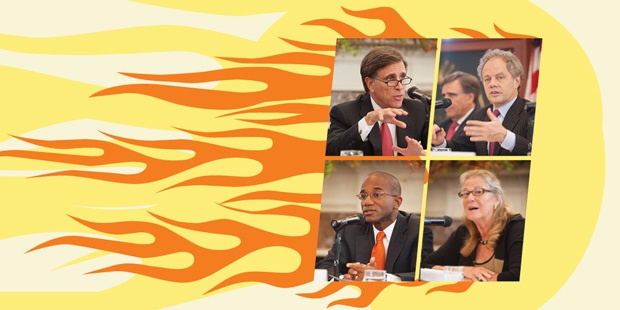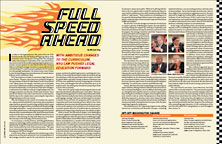Full Speed Ahead
With ambitious changes to the curriculum, NYU Law pushes legal education forward.
Printer Friendly VersionIn early 2011 the legal profession, like much of the rest of the business world, was still shaking off lingering effects of the economic crisis. Hiring was coming back, but only gradually, and among the leadership of the Law School there was concern that the forces affecting major legal employers were secular, not just cyclical. So Law School board chair Anthony Welters ’77 formed a strategy committee to assess whether NYU Law was doing all it could to prepare graduates for the needs of an evolving legal marketplace. He named trustee Evan Chesler ’75, then the presiding partner (now chairman) of Cravath, Swaine & Moore, as the committee’s chair.
“NYU has long been a leader in innovative legal education,” notes Chesler. “However, there have been profound changes in the expectations of clients for what lawyers need to be prepared to do.” Many clients, for example, now want even recent graduates to have collaborative problem-solving skills, to understand business fundamentals, or to know how to deal with colleagues or adversaries from different cultural or legal backgrounds. The strategy committee was formed, Chesler said, because “there was the the distinct sense that it was time for our law school to lead the way on the complex issues concerning the imperatives of legal education in the 21st century.”
After fact finding over the course of 18 months, the committee—whose members include NYU Law trustees who are leaders at major law firms, general counsel at large publicly traded companies and asset management firms, and others with deep knowledge of the legal marketplace—issued a series of recommendations for curriculum enhancements. Following faculty approval of central elements of the recommendations, then-dean Revesz and Chesler announced the plans to students at a Milbank Tweed Forum on October 17. That morning, the New York Times ran a story about the new steps on the front page of its business section.
“In recent years, a variety of forces, including globalization, advances in technology, and the worldwide economic crisis, have significantly changed the way law is practiced in many organizations,” Revesz said at the time of the announcement. “The steps we are announcing today assure that the education we offer is keeping pace with those changes.”
A multi-front effort to implement the initiatives got underway as soon as they were announced. One recommendation of the strategy committee was for the Law School to do more to prepare students for global legal practice, including the introduction of new study-abroad opportunities for students during their third year. Under the supervision of Kevin Davis, vice dean for global affairs and Beller Family Professor of Business Law, NYU has now established semester-long programs in Buenos Aires, Paris, and Shanghai that will accommodate up to 25 JD students each. The initial group of students is preparing to head to those cities in January.
“These aren’t the typical study-abroad programs that we and other law schools have offered for years,” notes Davis. “These are designed and managed by NYU Law faculty and they will include not just classroom study, but also clinics, internships, travel study, and language training,” with some variation based on location. In Buenos Aires and Paris, the programs will be operated in cooperation with local university partners. What’s more, Davis emphasizes, these semester-abroad experiences for 3Ls are meant to serve as the capstone of an extensive set of curricular and co-curricular options offered to JD students who are interested in global practice beginning in their first year.
 Closer to home, but still well off campus, is the Washington, DC-based Legislative and Regulatory Process Clinic that is being jointly taught by two of the foremost experts in Washington legal practice: Robert Bauer, former White House Counsel to President Obama, and Sally Katzen, a member of the Obama-Biden transition team who held a number of senior positions in the Clinton Administration. Combining the practical and the scholarly, the clinic’s 16 3L students work four days a week in a federal agency or government office, but also attend a weekly seminar, as well as special sessions with senior government officials and guest lecturers. The clinic is an outgrowth of a strategy committee recommendation calling for “a program of intensive study and practical training in the role of government,” noting that it would be relevant to many career paths. “What we’re offering with the clinic is the rare opportunity to study the machinery of government and the political process, while simultaneously working within it,” says Katzen. “These students are developing an on-the-ground understanding of what it means to be a government lawyer, combined with an instructional component that fosters insight and analysis.”
Closer to home, but still well off campus, is the Washington, DC-based Legislative and Regulatory Process Clinic that is being jointly taught by two of the foremost experts in Washington legal practice: Robert Bauer, former White House Counsel to President Obama, and Sally Katzen, a member of the Obama-Biden transition team who held a number of senior positions in the Clinton Administration. Combining the practical and the scholarly, the clinic’s 16 3L students work four days a week in a federal agency or government office, but also attend a weekly seminar, as well as special sessions with senior government officials and guest lecturers. The clinic is an outgrowth of a strategy committee recommendation calling for “a program of intensive study and practical training in the role of government,” noting that it would be relevant to many career paths. “What we’re offering with the clinic is the rare opportunity to study the machinery of government and the political process, while simultaneously working within it,” says Katzen. “These students are developing an on-the-ground understanding of what it means to be a government lawyer, combined with an instructional component that fosters insight and analysis.”
Not all of the curricular changes are limited to the third year or require a journey. At Washington Square, the Law School is currently rolling out stepped-up training in leadership and financial and business literacy for students at all levels of the JD program. The strategy committee noted that “lawyers in our society routinely become managers and leaders of organizations, yet law schools offer little training in leadership and collaboration.” In addition, the committee observed,“a large proportion of lawyers … encounter business and financial issues, yet law schools have long lagged in assuring that their graduates have a basic grounding in these areas.” Providing instruction in these areas, the committee said, will make NYU Law graduates “more attractive to employers and more helpful to their clients.”
The Law School, Vice Dean Jeannie Forrest observes, has long offered elements of leadership training through programs such as the Dean’s Roundtable and the Public Interest Law Center’s Leaders in Public Interest Series. Last February also saw the debut of the Leadership Series in Law and Business, when Herbert Kelleher ’56, the charismatic founder and chairman emeritus of Southwest Airlines, came to Vanderbilt Hall to talk about his career. But now, says Forrest, the Law School will emphasize leadership “in a much more conscious and deliberate way.”
Forrest, who has a doctorate in psychology, is overseeing one major initiative: offering students evaluation and instruction in EQ, or emotional intelligence, since an ability to deal with people in a thoughtful and empathic manner is critical to good leadership. During their orientation in August, all entering JD students were invited to take an online EQ assessment to help identify skills they may want to develop. And certain classes throughout the curriculum will incorporate EQ instruction, building on interpersonal skills training that has been part of the first-year Lawyering Program for many years.
This academic year, the Lawyering Program is also adding instruction on business and financial concepts—including statistical inference, core accounting practices, and time value of money analysis—by incorporating an intensive mini-class on these subjects into a transaction-negotiation exercise. The mini-class will be taught by Geoffrey Miller, Stuyvesant P. Comfort Professor of Law and director of NYU Law’s Center for Financial Institutions, and Gerald Rosenfeld, distinguished scholar in residence and senior lecturer, and co-director of the Mitchell Jacobson Leadership Program in Law and Business.
As the range and diversity of the Law School’s curriculum expand, it can be a challenge for students to decide how best to prepare for practice in a particular area of law. To address that, Vice Dean and Professor of Clinical Law Randy Hertz has worked with faculty to identify core courses that provide an essential foundation for practice in a number of fields students commonly enter, ranging from tax to civil litigation to intellectual property and information law. This Professional Pathways system offers advice on a sequenced course of instruction, including substantive-law classes, clinics, simulation courses, and seminars. In addition, Hertz notes, Pathways includes career guidance, utilizing faculty members, Office of Career Services counselors, and alumni to counsel students on employment options and how best to pursue them.
That combined approach was on display in April, when faculty held their first Pathways advisory sessions. At a session on criminal practice, for example, Professor Erin Murphy (who spent five years as a public defender) explained differences in two evidence classes taught at the Law School, one with a more nuts-and-bolts focus, the other more theoretical. She also discussed how students might decide between being a prosecutor or a public defender.
The Law School’s new dean, Trevor Morrison, has fully embraced the curricular initiatives. “The new measures squarely address concerns that have been raised by employers about the need for more practice-focused training, as well as questions that have been raised about the utility of the third year of law school,” he says. “At the same time, throughout our curriculum, we continue to emphasize the problem solving, critical thinking, and analytical skills that have long been the hallmarks of an outstanding legal education. It’s the combination of the two that will enable NYU Law graduates to excel throughout their careers.”
—

